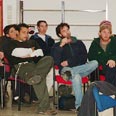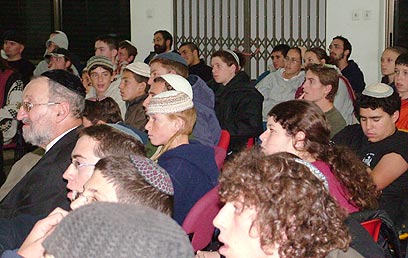
Settlers shift to political agenda
Leaders of settler communities are turning youths away from setting up illegal outposts and luring them into more active political participation
Following a deadly drive-by shooting attack at a junction leading to Gush Etzion where three of their friends were slaughtered, youths in the settlement have undertook a mission they are well accustomed to: Setting up illegal outposts on hills in Judea and Samaria. The latest adventure was near the Eliezer settlement.

'New outposts will be evacuated sooner or later' (Photo: Guy Ronen)
Yet not everyone agrees. Gush Etzion Regional Council Head Shaul Goldstein has been trying to show his young community members that the settlers need to adapt to a new reality: “Those days are gone, it’s a fantasy; it doesn’t work anymore.”
“Sometimes when you set off without previous consultations with local authorities you end up hurting us,” added Eli Mizrahi, head of the Efrat regional council.
Heads of regional councils met young settlers to exchange views about the issue of illegal outposts in the territories.
There might be a compromise on illegal outposts but the prospect of possible eviction of settlers from large West Bank settlements is daunting indeed, and both youths and adults are preparing for such a scenario.
“It is forbidden that this happen to us too,” Goldstein told some 150 youths still wearing orange shirts and ribbons - a color used by settlers in the anti-disengagement campaign --- who gathered at a local community center early Saturday evening.
Golstein warned that the ongoing establishment of illegal outposts damages the image and cause of settlers among the Israeli general public. “The new outposts will be evacuated sooner or later, yet they will pop up in the elections. The result will be that we will cry together facing the bulldozers of 2006,” Goldstein said.
Goldstein’s words did little to assuage the pent-up anger of a generation raised to follow in the footsteps of their parents, who sought to sow settlements all over the Land of Israel, yet are being told to be rational and cease illegal construction activities in the territories.
Goldstein and other community leaders are trying to turn young settlers away from outpost construction and lure them into more active political campaigning ahead of the general elections.
“We need to push the public slowly slowly to the right. From Shinui to Likud to the National Union, adding some Members of Knesset to our friends in parliament, and all will be different,” Goldstein said. He added that the settlers’ struggle is not limited to the future of settlements but also to other broad social issues, such as conversion and marital laws.
'Our outposts are worth nothing'
Shaul Goldstein is a bit of a different type of person among the settlers' leadership. Prior to the disengagement, he did not hesitate to criticize his colleagues, the huge demonstrations, and, in particular, the elitism sometimes characterizing the settlers.
"The seculars are doing some wonderful things, they are not nothing. They sacrifice their lives for the country just like we do, and these are our people, there is nothing else," he said.
"If we don’t reach out to them, if we don’t bring them here, we will lose," he added.
But how can this be done? How do you bring the town of Raanana to the settlement of Kfar Etzion? How do you connect Haifa to the settlement of Bat Ayin?
This question was tossed by the council head at the youths in attendance. And just like the diversity of the participants, there was a diversity of opinions.
The emergency assembly in Alon Shvut looked like a microcosmos of the entire "orange" public. But the dilemma can be summarized in one sentence: Should we hang on to the hills now, or in fact, to Tel Aviv?
"Our outposts are worth nothing," a youth from Neveh Daniel shouted at his friends.
"We have to go to them, connect to the people, have a celebration of Simhat Torah in the Sharon region. Bring masses, come by buses, come as underdogs but with our heads held up high," he said.
"There are among us more extreme groups looking for action and confrontations," another youth admitted.
"They go up and build an outpost in a cemetery and only cause us damage. Maybe Elon Moreh and Tapuah residents will not agree with me, but now we must leave the settlement for a while and go out to the people. Conduct a self-examination, recover from what happened to us, and go out," he said.
Like the leaders, the youths also understand that sometimes one violent picture can ruin an entire honorable battle, "burn" the entire public of settlers in the eyes of the public. Just like the picture of the father waving a baby from the window of his home moments before the Gaza evacuation, as well as the picture of Lieutenant Colonel Benny Shik, who suffered a blow to his eye while evacuating an outpost.
"Today I open the newspaper and see a picture of a soldier who has been badly beaten up, and the title above reads 'This is what will be done to a man defending the families.' This takes us way back," one of the participants said.
The same participant apparently did her homework and came with a list of suggestions and ideas: Building ad hoc outposts, which will be emptied out once police officers come near; writing articles, poems, books and plays; endless protests against ministers and Knesset members shown to be corrupt; and a particularly original initiative – a joint demonstration against the fence "with the leftists and Arabs," no less.
'Not all is lost'
All this in order to win some supportive media coverage, "so they understand that we don’t have horns."
Some of those who attended the convention said they blame the government, others blamed the Tel Avivians and the right-wing’s favorite punching bag: The ‘leftist’ media.
“They (journalists) were looking for blood during the disengagement and then apologized to their viewers for disappointing them,” one of those on hand said.
“The disengagement lost its TV ratings, and we don’t really interest them, so why bother? We should focus on expanding the settlement enterprise until it becomes unrealistic to evacuate.”
Another teen directed the blame inward, saying, “We tried to use force and failed, we tried with our hearts and failed; now we must find original ways. We must not be condescending.”
However, the youths all agreed that the West Bank security fence route, which does not contain the eastern settlements, is ruining their lives and is dooming them to evacuation.
When asked by the youths, “How long will it be until all of us, or at least those situated outside the security fence, are evacuated, Goldstein replied: “You are right to be concerned. If the Left continues to rule it will be a disaster. But nothing is lost, and a lot depends on us, on you.”










